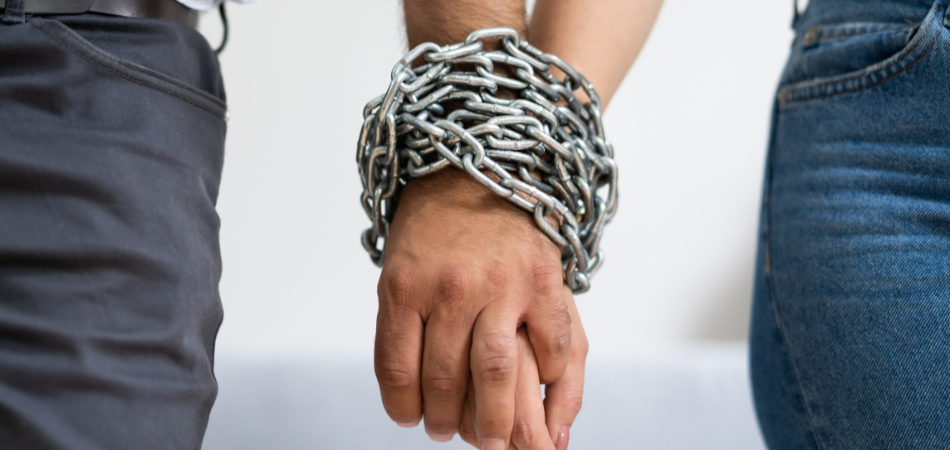Last Updated:
September 10th, 2025
Codependency and addiction
Codependency is one of the least discussed mental health conditions but it has a huge impact on sufferers and those closest to them. Living with codependency on its own can be tough enough but when addiction is also present, the outlook can be even bleaker. If you are currently dealing with the effects of addiction and codependency, UKAT knows that it can be a lonely, scary place. However, through our comprehensive treatment and support, you can learn to overcome addiction and develop new strategies and skills which will help you to manage codependency.

What is codependency?
Codependency is a psychological condition characterised by an excessive emotional or psychological dependence on another person. This person is usually someone who needs support due to illness or addiction, with the codependent individual having a deep-rooted need to care for others. While this may seem like an admirable trait, this is often at the expense of their own needs, which can lead to a one-sided, emotionally destructive or abusive relationship.
The concept of codependency initially emerged from patterns observed in families dealing with alcoholism. These families tended to neglect their own needs and aspirations in favour of looking after their addicted loved one, even to the point of enabling. Over time, however, codependency has been recognised in a broader spectrum of relationships and settings.
Despite this widespread acknowledgement, codependency is notably absent from the Diagnostic and Statistical Manual of Mental Disorders, Fifth Edition (DSM-V), which can complicate the understanding and treatment for many who suffer from it.
Common symptoms of codependency
Exploring the symptoms and signs of codependency helps individuals and healthcare providers identify and successfully manage the condition. While codependency symptoms can manifest differently from person to person, they typically include:
- Excessive caretaking: A compulsive need to care for others, often neglecting your own needs and potentially enabling the other person.
- Low self-esteem: Persistent feelings of inadequacy, often leading to a constant need for external validation.
- People-pleasing: An overwhelming desire to please others, frequently at the expense of your own well-being.
- Difficulty in setting boundaries: A habitual struggle in saying no, often leading to being taken advantage of or exploited.
- Fear of abandonment: An intense fear of losing the other person and being left alone. This can cause you to stay in unhealthy relationships, deepening the cycle of codependency.
- Dysfunctional relationships: Often finding yourself in relationships that are unfulfilling, abusive or neglectful.
- Conflict avoidance: This can mean apologising for things that were not your fault, accepting bad treatment in relationships or not communicating your feelings to loved ones.
These codependency symptoms can infiltrate every aspect of your life, from personal relationships to work, creating a pervasive impact on your overall well-being. These signs of codependency can be difficult to admit, but if you notice these tendencies in yourself, it may be worth seeking professional help.
What causes codependency?
The roots of codependency can often be traced back to childhood. In families where addiction is present, children often take on roles that inadvertently reinforce codependency. For example, a child might become the ‘caretaker’ of an addicted parent, a role that involves a level of emotional investment and responsibility far beyond their years. Many children in this situation also learn to suppress their own needs and feelings to accommodate the emotional or substance-related turmoil of their parents. While initially a survival mechanism, this early adaptation can evolve into a persistent pattern of codependent behaviour in adult relationships.
The link between codependency and addiction
At its core, the relationship between codependency and addiction can be seen as a mutually reinforcing cycle, where each condition exacerbates the other. This can create an incredibly challenging dynamic that can be difficult to break without professional intervention
- Covering up: Shielding the addicted individual from the consequences of their behaviour.
- Providing financial or emotional support: This helps to continuously facilitate their substance use and avoid some of the negative consequences.
- Neglecting personal boundaries: Failing to set or maintain healthy boundaries often leads to a cycle of rescuing and caretaking.
- Heightened fear of abandonment: The codependent individual may fear that addressing or confronting the addiction will lead to the end of the relationship, leaving them alone.
- Increased people-pleasing behaviours: In an attempt to keep the peace or stabilise the relationship, the codependent may go to even greater lengths to please or appease the addicted partner.
- Strengthened belief in being indispensable: The codependent might come to believe that they are the only ones who can help or save the addicted individual, reinforcing their caretaking role.
Manifestations of codependency and addiction
At UKAT, we have encountered various forms of codependency and addiction, each presenting unique challenges for sufferers. These include:
Codependency and sex addiction
In cases of sex addiction, some codependent individuals find themselves in a pattern of seeking validation through sexual behaviours. This need for affirmation and fear of abandonment can lead to risky and unhealthy sexual practices, further entrenching the cycle of addiction and codependency.
Codependency and love addiction
Love addiction often manifests as a chronic need for romantic attachment, regardless of its healthiness. This can lead to staying in a toxic relationship for fear of being alone or, conversely, jumping constantly from one relationship to another without ever feeling happy or fulfilled.
Codependency and drug addiction
When drug addiction is present in a codependent relationship, the dynamics can become particularly destructive. The codependent person may cover up or enable the addiction, often out of a misplaced sense of responsibility or love. This not only hinders the addicted individual’s chance of recovery but also perpetuates the codependent’s own unhealthy behaviours.
Codependency and alcohol addiction
Alcohol addiction in the context of a codependent relationship often leads to similar patterns as seen with drug addiction. The codependent person may become the caretaker, continually excusing or facilitating the addictive behaviour, thereby deepening the cycle of mutual dependency and addiction.
Treatment for codependency and addiction
The presence of codependency in addiction treatment presents unique challenges. The intertwined nature of these conditions means that addressing one without considering the other can hinder recovery. For example, a codependent individual may struggle to maintain sobriety if their need to please or care for an addicted partner leads them back into harmful environments or behaviours.
At UKAT, we recognise this complexity, so our UK-wide rehab centres offer proven addiction treatment, which can also provide valuable skills for managing codependency. Our bespoke UKAT London Clinic can go even further and offers a range of mental health treatment programmes for addiction, codependency and dual diagnosis care, which addresses both conditions simultaneously.
Some of the most important therapies in our rehab treatment programmes include:
Break free from addiction and codependency today
Embarking on a journey to overcome codependency and addiction is a deeply courageous step, and UKAT is committed to providing the support and care needed to navigate this path. Remember, real change is possible no matter how challenging your situation may seem. With professional support and a willingness to engage in the process of healing, you can break free from the chains of addiction and codependency. Reach out to UKAT and start your journey to recovery today.








